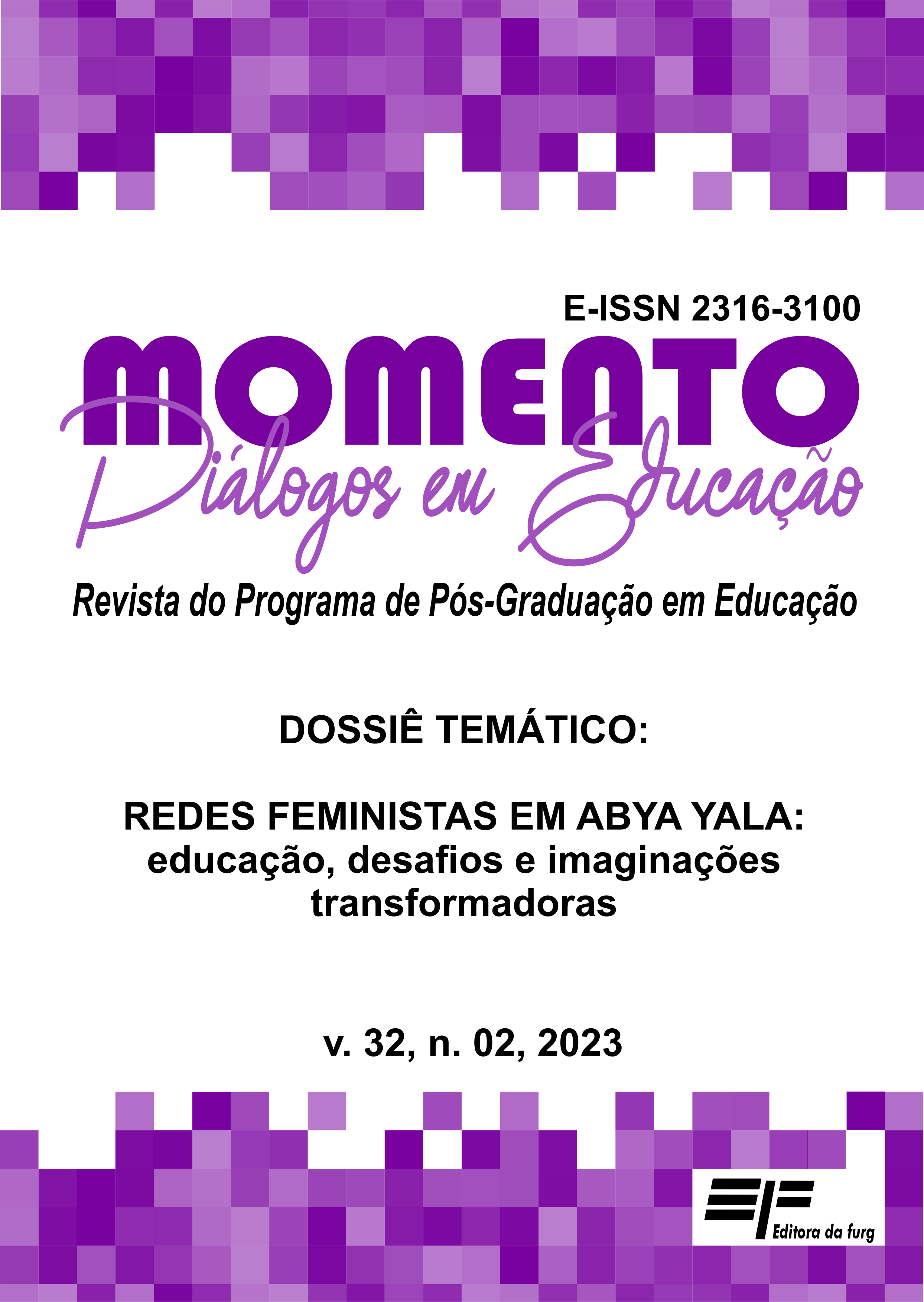ENTRE NUDOS, ROTURAS Y ENLACES
Redes feministas entre lo imprevisto y el cálculo del poder instituído
DOI :
https://doi.org/10.14295/momento.v32i02.15666Mots-clés :
Redes Feministas. Patriarcado. Instituciones. Capitalismo. Resistencias.Résumé
El presente artículo recorre experiencias locales de organización feminista en instituciones educativas y científicas, con el objetivo de localizar pistas útiles que nos permitan identificar las presiones que desarman las redes feministas o que atentan contra ellas y las posibles resistencias creativas para oponer a la lógica totalitaria del poder instituido. Asimismo, se analiza los problemas internos en dichas redes, como son la competencia, las aspiraciones individualistas y la dificultad de resistir a las presiones externas, las cuales colocan en riesgo la organización deseada. En efecto, desde la experiencia de organizar espacios feministas de activismo en la academia cordobesa (Argentina), se aborda los diferentes fenómenos que emergen entre resistir y responder a las presiones del poder institucional, en un escenario de subjetividades atravesadas por el heteropatriarcado capitalista. Para lo cual, como material de análisis se recurre a la propia experiencia de organizarse entre feministas, en conexión con lecturas históricas sobre lo que sucede con lxs sujetos cuando la presión del poder instituido opera en sus cuerpos y subjetividades. Así, se reconoce la relación entre las apuestas micropolíticas de creación frente y con el poder; las dificultades que enfrentan los feminismos para resistir a las presiones institucionales y la necesidad de supervivencia individual en contextos Heteropatriarcales y capitalistas.
Palabras claves: Redes Feministas. Patriarcado. Instituciones. Capitalismo. Resistencias.
Téléchargements
Références
Ahmed, Sara. Denuncia! El activismo de la queja frente a la violencia institucional. Argentina: Caja Negra, 2023.
Báez, Jairo. El psicoanálisis y la institución (El eterno des-encuentro). Tesis Psicológica, núm. 6, noviembre, 2011, pp. 236-243. Colombia: Fundación Universitaria Los Libertadores Bogotá. 2022.f.236-243. 2011.
Bénard Calva Silvia Autoetnografía. Una metodología cualitativa. México: Universidad Autónoma de Aguascalientes, 2019.
Bochner, Arthur. Perspectives on inquiry III: The moral of stories. Estados Unidos de América: Sage. 1994.
Berlant, Lauren. El Optimismo Cruel. Argentina. Caja Negra. 2020.
Ellis, Carolyn. The ethnographic I. A methodological novel about autoethnography. Estados Unidos de América: Altamira, 2004.
Ellis, Carolyn, Adams, T. y Bochner, A. Autoethnography: an overview. Forum: Qualitative Sozialforschung 12(1). Acceso 3 de julio del 2023. 2010. Dsponible en: http://www.qualitativeresearch.net/index.php/fqs/article/view/1589/3095
Haraway, Donna.; Torres, Helen. Seguir con el problema: Conversación entre Donna Haraway y Helen Torres. Acceso 3 de julio del 2023. 2020.Disponible em https://www.youtube.com/watch?v=-WN6SYkjQSs
Honneth, Axel. La lucha por el reconocimiento. Barcelona: Crítica. 1997.
Jasper James. Las emociones y los movimientos sociales: veinte años de teoría e investigación. Revista Latinoamericana de Estudios sobre Cuerpos, Emociones y Sociedad. 4(10), 46-6. Acceso 3 de Julio de 2023. 2012. ISSN: 1852-8759. Disponible en: https://www.redalyc.org/articulo.oa?id=273224904005
Klein, Laura. Más acá del bien y del mal. por un feminismo imposible. Argentina, Red Editorial. 2019.
Lieselotte Viaene, Catarina Laranjeiro y Miye Nadya Tom. Las paredes hablaban cuando nadie más lo hacía. Notas autoetnográficas sobre control y poder sexual en el mundo académico de vanguardia. Acceso 3 de julio del 2023. 2023. Disponible en: https://contrahegemoniaweb.com.ar/2023/04/24/las-paredes-hablaban-cuando-nadie-mas-lo-hacia/
Melandri, Lea. La modificación personal no es una revolución. Revista Disenso. Abril 14, 2. Acceso 3 de julio del 2023. 2021. Disponible en: https://revistadisenso.com/la-modificacion-personal-no-es-una-revolucion/
Lorde, Audre. La hermana, la extranjera. Artículos y conferencias. Madrid, Ed. Horas, 2003.
Míguez, Pablo. Trabajo y valorización del conocimiento en el siglo XXI: Implicancias económicas de la movilización del saber. Revista Estado y Políticas Públicas, Núm. 10, pp. 39-59. Acceso 3 de junio del 2023. 2018. Disponible em: https://repositorio.flacsoandes.edu.ec/handle/10469/13920
Míguez, Pablo. Del General Intellect a las tesis del capitalismo cognitivo: Aportes para el estudio del capitalismo del siglo XXI. Bajo el Volcán, Vol. 13, Núm. 21, pp. 27-53. Acceso 3 de julio del 2023. 2014.Disponible en: https://www.redalyc.org/pdf/286/28640302003.pdf
Richard, Nelly. Feminismo, género y diferencia(s). Santiago de Chile: Palinodia, 2008.
Ossa, Carlos. El ego explotado. Capitalismo cognitivo y precarización de la Creatividad. Santiago de Chile. Ediciones de la Universidad de Chile, 2016.
Shulman, Sara. El conflicto no es abuso. Contra la sobredimensión del daño. Argentina, Paidos. 2023.
Weber, Max. Economía y sociedad. La Habana: Editorial de Ciencias Sociale, 1971.
Zenobi, Diego. Antropología política de las emociones: Las movilizaciones de víctimas en América Latina. Asociación Americana de Antropología. Volumen 25 , Número 1. Acceso 3 de julio del 2023.2020. Disponible en: https://anthrosource.onlinelibrary.wiley.com/doi/epdf/10.1111/jlca.12446
Téléchargements
Publié-e
Comment citer
Numéro
Rubrique
Licence
© Momento - Diálogos em Educação 2023

Cette œuvre est sous licence Creative Commons Attribution 4.0 International.
À Revista Momento − Diálogos em Educação, ficam reservados os direitos autorais, de todos os artigos nela publicados.


